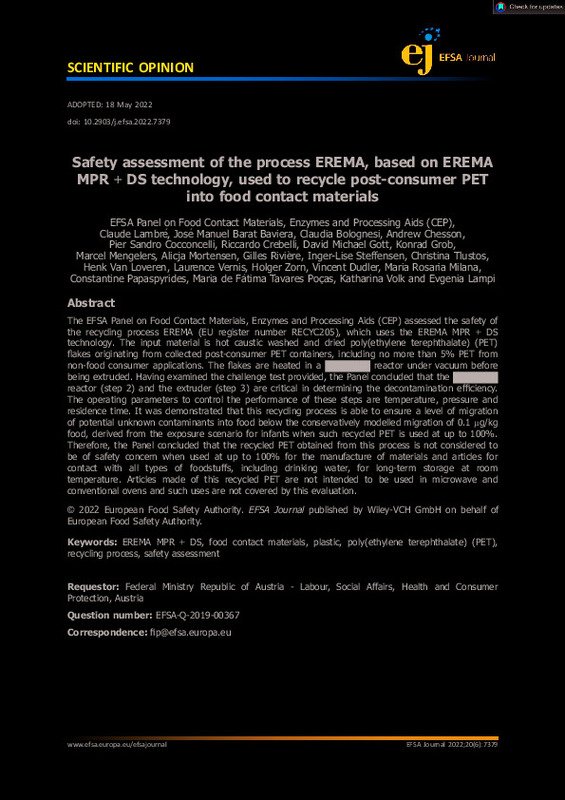JavaScript is disabled for your browser. Some features of this site may not work without it.
Buscar en RiuNet
Listar
Mi cuenta
Estadísticas
Ayuda RiuNet
Admin. UPV
Safety assessment of the process EREMA, based on EREMA MPR + DS technology, used to recycle post-consumer PET into food contact materials
Mostrar el registro sencillo del ítem
Ficheros en el ítem
| dc.contributor.author | Lambré, Claude
|
es_ES |
| dc.contributor.author | Barat Baviera, José Manuel
|
es_ES |
| dc.contributor.author | Bolognesi, Claudia
|
es_ES |
| dc.contributor.author | Chesson, Andrew
|
es_ES |
| dc.contributor.author | Cocconcelli, Pier Sandro
|
es_ES |
| dc.contributor.author | Crebelli, Riccardo
|
es_ES |
| dc.contributor.author | Gott, David Michael
|
es_ES |
| dc.contributor.author | Grob, Konrad
|
es_ES |
| dc.contributor.author | Mengelers, Marcel
|
es_ES |
| dc.contributor.author | Mortensen, Alicja
|
es_ES |
| dc.contributor.author | Rivière, Gilles
|
es_ES |
| dc.contributor.author | Inger-Lise Steffensen
|
es_ES |
| dc.contributor.author | Tlustos, Christina
|
es_ES |
| dc.contributor.author | van Loveren, Henk
|
es_ES |
| dc.contributor.author | Vernis, Laurence
|
es_ES |
| dc.date.accessioned | 2023-06-06T18:01:52Z | |
| dc.date.available | 2023-06-06T18:01:52Z | |
| dc.date.issued | 2022-06 | es_ES |
| dc.identifier.uri | http://hdl.handle.net/10251/193917 | |
| dc.description.abstract | [EN] The EFSA Panel on Food Contact Materials, Enzymes and Processing Aids (CEP) assessed the safety of the recycling process EREMA (EU register number RECYC205), which uses the EREMA MPR + DS technology. The input material is hot caustic washed and dried poly(ethylene terephthalate) (PET) flakes originating from collected post-consumer PET containers, including no more than 5% PET from non-food consumer applications. The flakes are heated in a reactor under vacuum before being extruded. Having examined the challenge test provided, the Panel concluded that the reactor (step 2) and the extruder (step 3) are critical in determining the decontamination efficiency. The operating parameters to control the performance of these steps are temperature, pressure and residence time. It was demonstrated that this recycling process is able to ensure a level of migration of potential unknown contaminants into food below the conservatively modelled migration of 0.1 lg/kg food, derived from the exposure scenario for infants when such recycled PET is used at up to 100%. Therefore, the Panel concluded that the recycled PET obtained from this process is not considered to be of safety concern when used at up to 100% for the manufacture of materials and articles for contact with all types of foodstuffs, including drinking water, for long-term storage at room temperature. Articles made of this recycled PET are not intended to be used in microwave and conventional ovens and such uses are not covered by this evaluation. | es_ES |
| dc.language | Inglés | es_ES |
| dc.publisher | Willey | es_ES |
| dc.relation.ispartof | EFSA Journal | es_ES |
| dc.rights | Reconocimiento - Sin obra derivada (by-nd) | es_ES |
| dc.subject | EREMA MPR plus DS | es_ES |
| dc.subject | Food contact materials | es_ES |
| dc.subject | Plastic | es_ES |
| dc.subject | Poly(ethylene terephthalate) (PET) | es_ES |
| dc.subject | Recycling process | es_ES |
| dc.subject | Safety assessment | es_ES |
| dc.subject.classification | TECNOLOGIA DE ALIMENTOS | es_ES |
| dc.title | Safety assessment of the process EREMA, based on EREMA MPR + DS technology, used to recycle post-consumer PET into food contact materials | es_ES |
| dc.type | Artículo | es_ES |
| dc.identifier.doi | 10.2903/j.efsa.2022.7379 | es_ES |
| dc.rights.accessRights | Abierto | es_ES |
| dc.contributor.affiliation | Universitat Politècnica de València. Escuela Técnica Superior de Ingeniería Agronómica y del Medio Natural - Escola Tècnica Superior d'Enginyeria Agronòmica i del Medi Natural | es_ES |
| dc.description.bibliographicCitation | Lambré, C.; Barat Baviera, JM.; Bolognesi, C.; Chesson, A.; Cocconcelli, PS.; Crebelli, R.; Gott, DM.... (2022). Safety assessment of the process EREMA, based on EREMA MPR + DS technology, used to recycle post-consumer PET into food contact materials. EFSA Journal. 20(6):1-13. https://doi.org/10.2903/j.efsa.2022.7379 | es_ES |
| dc.description.accrualMethod | S | es_ES |
| dc.relation.publisherversion | https://doi.org/10.2903/j.efsa.2022.7379 | es_ES |
| dc.description.upvformatpinicio | 1 | es_ES |
| dc.description.upvformatpfin | 13 | es_ES |
| dc.type.version | info:eu-repo/semantics/publishedVersion | es_ES |
| dc.description.volume | 20 | es_ES |
| dc.description.issue | 6 | es_ES |
| dc.identifier.eissn | 1831-4732 | es_ES |
| dc.identifier.pmid | 35784817 | es_ES |
| dc.identifier.pmcid | PMC9235441 | es_ES |
| dc.relation.pasarela | S\486729 | es_ES |
| dc.description.references | EFSA (European Food Safety Authority) , 2008. Guidelines for the submission of an application for safety evaluation by the EFSA of a recycling process to produce recycled plastics intended to be used for manufacture of materials and articles in contact with food, prior to its authorisation. EFSA Journal 2008,6(7):717, 12 pp. https://doi.org/10.2903/j.efsa.2008.717 | es_ES |
| dc.description.references | EFSA (European Food Safety Authority) , 2009. Guidance of the Scientific Committee on transparency in the scientific aspects of risk assessments carried out by EFSA. Part2: general principles. EFSA Journal 2009;7(5):1051, 22 pp. https://doi.org/10.2903/j.efsa.2009.1051 | es_ES |
| dc.description.references | EFSA CEF Panel (EFSA Panel on Food Contact Materials, Enzymes, Flavourings and Processing Aids (CEF) , 2011. Scientific opinion on the criteria to be used for safety evaluation of a mechanical recycling process to produce recycled PET intended to be used for manufacture of materials and articles in contact with food. EFSA Journal 2011;9(7):2184, 25 pp. https://doi.org/10.2903/j.efsa.2011.2184 | es_ES |
| dc.description.references | FDA (Food and Drug Administration) , 2006. Guidance for industry: use of recycled plastics in food packaging: chemistry considerations. Available online: https://www.fda.gov/regulatory‐information/search‐fda‐guidance‐documents/guidance‐industry‐use‐recycled‐plastics‐food‐packaging‐chemistry‐considerations | es_ES |








